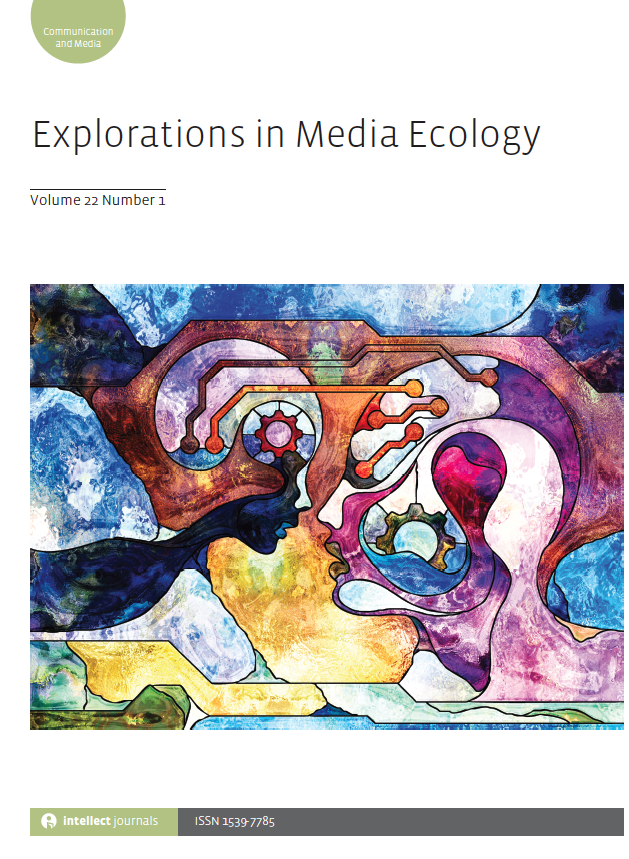- Home
- A-Z Publications
- Explorations in Media Ecology
- Previous Issues
- Volume 5, Issue 3, 2006
Explorations in Media Ecology - Volume 5, Issue 3, 2006
Volume 5, Issue 3, 2006
-
-
Concerning Media Ecology
More LessBy Eric McLuhanAbstractThe world, especially the West, is currently in the grip of the largest and grandest renaissance in all of human history, and the author contends that the situation should be of profound media ecological concern. Every imaginable corner of culture, arts, and sciences demonstrate evidence of the present ferment of discovery and rediscovery, rendered almost invisible by the presence and pervasiveness facilitated by electronic media. Electronic media have also engendered a shift toward nomadism—physical, cultural, and metaphysical. Media ecology, he asserts, has a duty to warn the public and legislators of the toxic side effects of new media/environments in the world’s cultures and societies, including our own. The author invites media ecologists to renew their fervour in efforts to understand and explain the services, disservices, and rearrangements in the scale and pace of life and culture and self that we make in accommodating ourselves to new technologies.
-
-
-
The Flouting of the First Amendment
More LessAbstractThe First Amendment has received mounting and nearly unprecedented flouting at the hands of the Federal Communications Commission (FCC) and Congress in the past few years, with massive fines levied against broadcasters for alleged violations of ambiguous public decency standards. The history of the First Amendment in America is outlined here—from its Jeffersonian beginnings contested by John Adams and the Federalists, through its relative golden age in the 19th century, to a 20th century of relentless battering by “clear and present danger” Supreme Court decisions and FCC rulings. We stand at a crossroads here at the beginning of the 21st century, where anything less than strong support of the First Amendment under fire could result in its disappearance from American life.
This article is based on the keynote address given at the sixth annual convention of the Media Ecology Association, held at Fordham University in New York City in 2005.
-
-
-
Exhibiting the Future: New Technology on Public Display
More LessAbstractIn the modern world, our understanding of the present is often shaped by science fiction fantasies about what is to come. Ironically, the most influential of these visions of the future are already decades old. We are already living in the times when they were supposed to have come true. In this article, the author analyses the origins and evolution of the imaginary future of artificial intelligence in the 1950s and 1960s. By showing that the future is what it used to be, he argues that it is time for us to invent new futures.
-
-
-
Media, Religion and Cultures: The Role of the Jesuit Communication “Bias” in the Formation of Cultures
More LessAbstractIn the emerging field of media and religion, the cultural studies focus is asking what kind of religious cultures are being creating in the context of the media. One of the questions not taken up by the media, religion, and cultures network of scholars is the dimension of history and, specifically, what Innis called the “bias of communication” in cultural history. Following Innis’ argument that the dominant form of communication in an historical era influences the cultural impact of that era, this chapter asks how the oral, interpersonal communication bias of religious movements in early modern Europe and specifically the Jesuit movement influenced the religious culture and the emerging “city culture” of modern Europe.
-
-
-
Grammar as Pedagogy
More LessBy Marc ZuckerAbstractThe author poses the argument that grammar be used as a basis for a pedagogical tool throughout all disciplines. Specific examples are chosen to highlight the ability of grammar to be used as a basis for reflection on language and beyond that as a pedagogical catalyst for reflective thought in any discipline. He shows that it is the students’ own intuitive grasps on the use of language that are the driving forces behind this approach.
-
Volumes & issues
-
Volume 22 (2023)
-
Volume 21 (2022)
-
Volume 20 (2021)
-
Volume 19 (2020)
-
Volume 18 (2019)
-
Volume 17 (2018)
-
Volume 16 (2017)
-
Volume 15 (2016)
-
Volume 14 (2015)
-
Volume 13 (2014)
-
Volume 12 (2013)
-
Volume 11 (2012)
-
Volume 10 (2011)
-
Volume 9 (2010)
-
Volume 8 (2009)
-
Volume 7 (2008)
-
Volume 6 (2007)
-
Volume 5 (2006)
-
Volume 4 (2005)
-
Volume 3 (2004)
-
Volume 2 (2003)
-
Volume 1 (2002)
Most Read This Month


